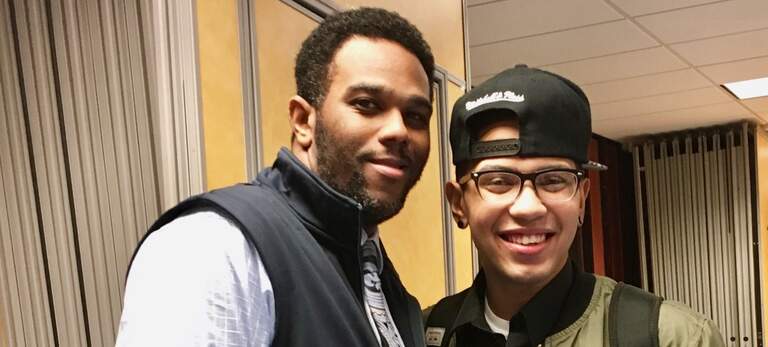NYC Service, a division of the Mayor's Office in New York City that promotes volunteerism, published this essay by longtime mentor Sherman Reid in celebration of National Mentoring Month this January. For more about Sherman and his mentee Jeffry, watch this video created by Fatherly.
Growing up, I had a tough time in high school. I struggled with my classes and lacked focus. Though my mom was a teacher, as a single parent she was just one person. When I was in college, I was placed on academic probation and then dismissed after the first year. After many trials and tribulations, I was reinstated as a student, and from that point on, I turned my life around.
After college graduation in 2001, I held several retail jobs before landing an internship at Bloomberg through Phipps in the Bronx. Today, I have a successful career at Bloomberg as a sales professional.
I signed up to be a mentor because I had struggled for a long time before I could get on the right track for education and a career. I became a mentor so that a young person who needs direction, like I did, can have a better chance of fulfilling their potential. So a student can beat the odds that may be stacked against them on account of race or economics. So they can light a path to their own success.
I met my mentee, Jeffry, when he was in ninth grade. Jeffry is a very laid-back, cool kid, and we spent the first year just getting to know each other and building trust. Through the iMentor program, we exchanged regular emails and shared our highs and lows for each week. We also met up in person at his school each month, and I asked Jeffry to teach me a new word in Spanish each time we met. I wanted to make him feel comfortable, and I also hoped to better understand him. I had to learn to be patient. I tried not to be rigid in my expectations that first year. If Jeffry just spoke one word—well, at least I got one word.
Over time, I discovered that Jeffry was into video games, similar to my son, and we both liked movies and Marvel comics. In our second year together, we started talking about his classes, exploring the college process, and making plans for his future. We worked on prioritizing and managing time—skills that I had to develop over the years out of necessity. I hoped these skills could serve as a foundation for him as he headed toward college.
During Jeffry’s senior year, he faced a lot of adversity and I was afraid that he would not be able to graduate high school. But he dealt with those issues head-on, and his determination led to success. As a mentor, I am enormously proud that Jeffry overcame these challenges with hard work. This very same quality of perseverance has won him many academic accolades: making the Dean’s List his first semester at NYC College of Technology, being invited to join the Honors Scholars Program at City Tech, and, in 2018, taking third place in a math competition focused on differential equation modeling.
Now, seven years into our mentor-mentee relationship, Jeffry is thriving as a junior in college. He loves to code and is majoring in computer science. He shares practically everything about his academics with me, often before he tells those closest to him. When he was considering switching to a college with a weaker computer science program because his financial aid package was not enough, I was able to connect him with resources that ultimately enabled him to stay in his program.
Like a lot of kids from his neighborhood in Fordham in the Bronx, Jeffry has not always had the opportunity to showcase his potential. But now he has achievements that no one can take away from him. Soon he will be graduating and starting an exciting new phase of his life. In gaming parlance, Jeffry beat the first level. He made it to the second level. He knows to get back in the trenches and do it all over again. I am able to offer a little help from the sidelines as a mentor, but Jeffry is now the one who maintains a laser focus on his future.
Through our relationship, Jeffry has taught me the virtue of patience. As a mentor, simply being present for your mentee is as important as anything else. Stick with it and keep showing up, even if your mentee isn’t responding. Your mentees are listening. They will remember your words. They will appreciate that you were there. And they will apply your advice at some point in life.
Sherman Reid has volunteered as a mentor with iMentor for seven years.

